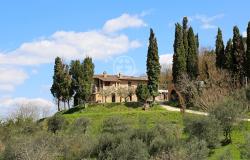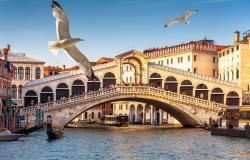 Centre-left Premier Romano Prodi remained in the saddle on Wednesday, surviving a knife-edge, do-or-die vote in the Senate.
Centre-left Premier Romano Prodi remained in the saddle on Wednesday, surviving a knife-edge, do-or-die vote in the Senate.
The premier won the confidence vote with 162 votes, two more than the majority needed, with 157 voting against him.
"I'm very pleased," the premier said afterwards, stressing that his coalition had "proved its self-sufficiency".
Prodi quit last Wednesday after losing a foreign policy vote in the Senate, where his nine-month-old, Communists-to-Catholics government hangs by a thread.
President Giorgio Napolitano rejected Prodi's resignation at the weekend but asked him to test his majority in parliament.
Another confidence vote will now be held in the House on Friday.
That vote poses no problem for the premier, who enjoys a solid majority in the lower chamber.
Prodi, who won the narrowest of victories against centre-right chief Silvio Berlusconi in last April's general election, holds only one more seat than the opposition in the Senate.
But the premier was able to count on extra support from top opposition moderate Senator Marco Follini, who switched sides last week, and four of the upper chamber's seven life senators: former presidents Carlo Azeglio Ciampi and Oscar Luigi Scalfaro, ex-Christian Democrat premier Emilio Colombo and Nobel-winning scientist Rita Levi Montalcini.
Two other life senators, seven-time former premier Giulio Andreotti and auto-styling legend Sergio Pininfarina, did not take part in the vote, which lowered the quorum needed for Prodi to survive the test to 160.
The seventh life senator, former president Francesco Cossiga, voted against Prodi.
The opposition was certain to contest Prodi's reliance on the life senators' help in the ballot.
Dubbed the "magnificent seven", the life senators hold the balance of power and have come to the government's rescue several times in the past.
Berlusconi stressed that the vote of Follini, who served as deputy premier in his government, had been decisive.
Prodi's precarious grip on power and the constant squabbling in his nine-party coalition led the opposition to brand the 67-year-old former European Commission chief a "dead man walking".
The premier has frequently resorted to confidence votes in parliament to keep his allies in line - Wednesday's was the 14th since he came to power.
Political analysts agreed that Prodi remained weak and at the mercy of his own senators, particularly over foreign policy.
Another divisive issue is that of granting certain rights to cohabiting heterosexual and same-sex couples with a bill dubbed DICO.
His cabinet approved the bill earlier this month and it is now before the Senate Justice Committee.
But the planned law is fiercely opposed by the Vatican and Pope Benedict XVI.
Many Catholic centrists in Prodi's coalition, including Justice Minister Clemente Mastella, are also consequently against the bill, leading to clashes with the Left side of the alliance.
The DICO cost Prodi the support on Wednesday of Andreotti, a veteran Christian Democrat who admitted to feeling "bitter" over the bill.
PRODI SEEKS TO APPEASE LEFTIST ALLIES.
The government's Senate defeat last week was mainly caused by two hard-left senators who voted against it in anger at the continuation of a peacekeeping mission in Afghanistan and plans to enlarge a US military base on Italian soil.
Prodi, whose first, 1996-98 government was brought down by a leftist ally, insisted in his pre-vote speech to the Senate that his coalition was "strong and united".
In a bid to appease hard-leftists and pacifists on foreign policy issues, Prodi stressed that the government was working hard to find "political solutions" in Afghanistan and trying to muster support for a peace conference on the conflict-torn nation.
Three allies - the Communist Refoundation Party, the Italian Communists' Party and the Greens - want Italy to pull out of Afghanistan, arguing that the country has become too dangerous for a peacekeeping mission.
But the parties joined their coalition partners in accepting a new, "non-negotiable" 12-point programme drawn up by Prodi in the wake of last week's crisis which commits them to supporting the government's foreign policy, including the continuation of the peacekeeping mission in Afghanistan.
Another key clause in the pact is that the premier has the final word in the event of a row - a bid to end the feuding in his disparate coalition.
Prodi addressed the other highly divisive issue for his alliance in his speech - the DICO bill.
Prodi said the government had "completed its job" in presenting the DICO bill to parliament, implying that the matter was now in parliament's hands.
He urged parliament to work on the bill to "create a text which enjoys broad consensus".
"It's a delicate issue which should be left to lawmakers' individual consciences," added the premier.
Prodi also listed electoral reform as a priority.
The previous, Berlusconi-led government pushed through a controversial electoral reform only four months before the last elections which returned Italy to full proportional representation (PR).
The reform has been criticised as complex and muddled and has been blamed by parties on both sides for creating political instability and the risk of hung parliaments in a country which has seen more than 60 postwar governments.









